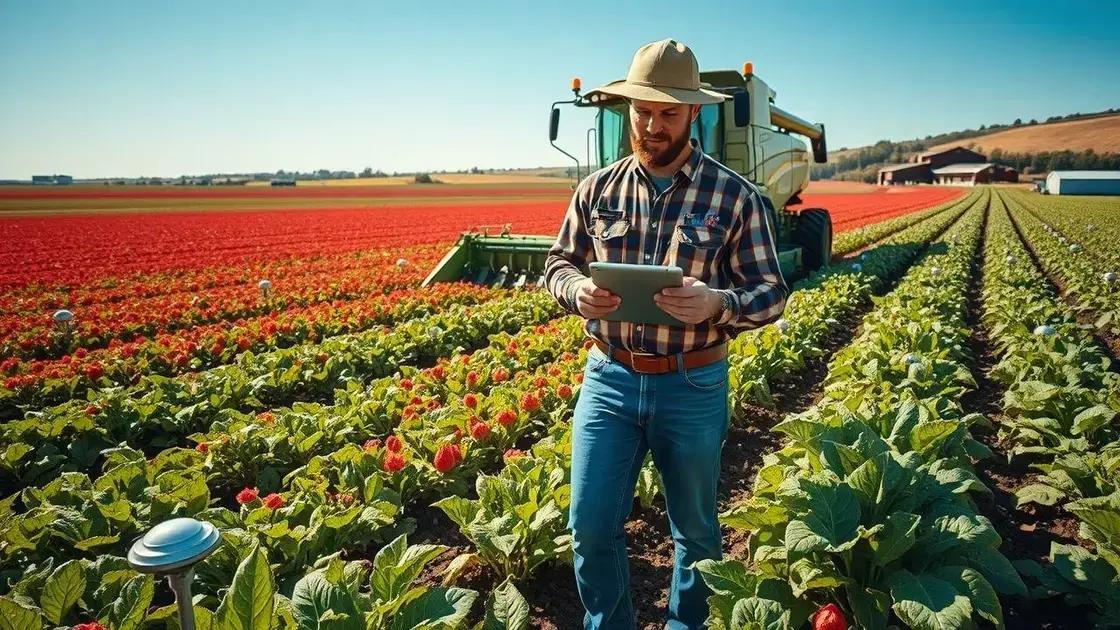Expanded knowledge of AI in agricultural innovation
Expanded knowledge of AI in agricultural innovation enhances productivity, sustainability, and efficiency in farming practices through precision agriculture, data management, and technological integrations.
Expanded knowledge of AI in agricultural innovation can significantly enhance how farmers approach their work. Imagine using smart technology to boost crop yields or tackle environmental challenges. This article delves into the transformative power of AI in agriculture.
understanding AI applications in agriculture
Understanding AI applications in agriculture is essential for modern farming practices. Farmers today face numerous challenges, from climate change to market demands. Artificial Intelligence offers innovative solutions to address these issues.
What is AI in Agriculture?
AI involves using technology to analyze data and make decisions that improve agricultural processes. This process can lead to increased efficiency and productivity.
Applications of AI Technologies
There are several ways AI is applied in farming:
- Precision farming: AI helps farmers use resources more efficiently, targeting only areas that need attention.
- Predictive analytics: AI analyzes weather patterns and crop data to forecast yields and optimize planting schedules.
- Automated machinery: Robots and drones equipped with AI can perform tasks such as planting, watering, and harvesting.
By integrating these technologies, farmers can enhance their productivity significantly. For example, drone technology allows for real-time monitoring of crops, helping to identify pests or diseases early.
Moreover, AI also plays a crucial role in resource management. With data analytics, farmers can determine the best times to water crops, ensuring optimal growth while conserving water.
Benefits of AI in Agriculture
The benefits of AI in agriculture extend beyond just increased yields. Farmers also enjoy:
- Reduced labor costs due to automation.
- Improved crop quality through enhanced monitoring.
- Better decision-making based on data-driven insights.
As the agricultural landscape continues to evolve, understanding how to utilize AI will be vital for farmers looking to maintain a competitive edge. The incorporation of AI technologies in agriculture is not just a trend; it’s a necessary shift towards sustainable farming practices.
case studies of AI success in farming

Case studies of AI success in farming highlight the remarkable changes technology has brought to agriculture. Many farmers have adopted AI solutions, leading to increased efficiency and productivity.
Innovative Applications in Real Farms
One example involves precision agriculture, where farmers use AI to analyze soil conditions. This technology helps them understand which areas need more irrigation or nutrients.
Smart Farming at Work
A notable case study features a vineyard utilizing AI-driven sensors. These sensors monitor grape maturity, allowing the vineyard owner to harvest at the perfect time, improving wine quality.
Additionally, a vegetable farm implemented robotic harvesting. These robots identify ripe produce and pick it, reducing labor costs and increasing speed.
Impact of Data Analytics
A large agricultural company used AI to analyze weather data. By predicting rainfall and temperature, they adjusted their planting strategies. This led to a significant increase in crop yields.
Another success story is a dairy farm that integrated AI to monitor cow health. AI algorithms detected early signs of illness, allowing for prompt veterinary care, which improved overall herd productivity.
These case studies show that embracing AI can lead to remarkable benefits in farming. By employing innovative technologies, farmers not only improve their yields but also contribute to sustainability in the agricultural sector.
challenges in adopting AI technologies
Challenges in adopting AI technologies in agriculture are significant, yet they are not insurmountable. Many farmers are eager to use these advancements but face various obstacles.
High Initial Costs
One of the primary barriers is the high initial costs of AI technology. Investing in smart tools and software can be daunting, especially for small farms. Many farmers worry about the return on investment.
Data Management Issues
Data management also presents challenges. Farmers need to collect large amounts of data to train AI systems effectively. This can be overwhelming, as proper data handling requires skills that not all farmers possess.
- Data quality: Inaccurate or incomplete data can lead to poor AI decisions.
- Integration: New AI tools must integrate smoothly with existing systems.
- Privacy concerns: Farmers may worry about how their data is used and shared.
Moreover, the lack of technical skills is another barrier. Many farmers might not feel equipped to operate advanced technologies or interpret the AI-generated data.
A further challenge is the rapid pace of technological advances. Farmers may hesitate to invest in AI systems that could become outdated quickly. They need assurance that their investment will provide long-term benefits.
Regulatory Hurdles
There are also regulatory hurdles to consider. Different regions may have varying laws regarding technology use in agriculture, making it hard for farmers to navigate legal requirements.
Yet, overcoming these challenges is possible with the right education and support. As awareness of these issues grows, farmers can learn to adopt AI technologies effectively.
the future of AI in agricultural practices

The future of AI in agricultural practices looks promising, with innovations continuously emerging to help farmers. As technology advances, AI will play an even greater role in how crops are managed and harvested.
Enhanced Precision Farming
One expected advancement is in precision farming. Future AI systems will use more accurate data to optimize planting, irrigation, and pesticide use. Farmers will be able to make real-time adjustments based on detailed insights from their fields.
Integration of AI with Other Technologies
Moreover, AI will increasingly integrate with other technologies like IoT (Internet of Things) devices. For instance, smart sensors will collect data on soil moisture and weather conditions. This information can then be analyzed by AI to recommend the best times for planting and harvesting.
In addition, the rise of machine learning will enable these systems to learn from past data, improving their predictions over time. Farmers could anticipate crop failures or diseases before they occur, leading to proactive management strategies.
Impact on Sustainability
The future of AI in agriculture also emphasizes sustainability. AI can help farmers use resources more efficiently, reducing waste. By analyzing data, AI can suggest optimized fertilizer use, which not only boosts crop yields but also minimizes environmental impact.
Furthermore, autonomous farming equipment is expected to become more common. Drones and robots will assist in monitoring crop health and performing tasks such as planting and spraying. This automation will save time and labor costs.
Training and Adaptation
To thrive in this AI-driven future, farmers will need ongoing training. Understanding how to leverage these technologies can make a significant difference in productivity. Educational programs can help farmers gain the skills needed to adapt.
As these technologies evolve, their impacts on agriculture will be profound. The integration of AI will lead to more efficient, sustainable, and productive farming practices that will shape the future of food production.
FAQ – Frequently Asked Questions about AI in Agriculture
How can AI improve farming practices?
AI enhances farming practices by optimizing resource usage, predicting crop yields, and automating tasks, leading to increased efficiency and productivity.
What are the main challenges in adopting AI in agriculture?
The main challenges include high initial costs, data management issues, lack of technical skills, and navigating regulatory requirements.
How can farmers learn to use AI technologies effectively?
Farmers can participate in training programs and workshops that focus on AI applications in agriculture to improve their skills and understanding.
What is the role of sustainability in AI agriculture?
AI technologies promote sustainability by reducing resource waste, enhancing crop management, and supporting eco-friendly farming practices.





